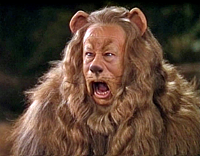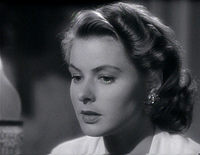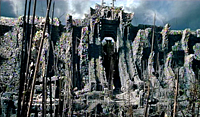The Passion of the Kong
How to Turn a Classic into a Masterpiece
An Appreciation by Barry M. Lamont
Notre-Dame de Paris
There are three good ways to remake a movie: you can make it better; you can make it different; or you can make it with a completely new perspective.
The first approach ("better") only works to the extent that the original version needs improvement. Certainly a film dependent on outdated visual effects can be made to look much more dazzling, and for some people (and for the market) that may be enough. The problem is that you have to remake a whole movie, not just the visual pieces. If the original is obscure, its visual effects probably aren't the only reason; if the original is well-known, and therefore presumably well-liked, every difference in the remake becomes a source of distress. Some viewers may concede that the new version looks better, but insist that it lacks the spirit of the original - the innocence, the excitement, the heart; for others, the imperfections of the original are part of its charm, and the new visual effects may be perceived as soulless and mechanical. It may also be the case that only one element of the original is "deficient", and a remake will inevitably be inferior in every other respect; CGI has been around for two decades, getting better every year, but nobody has seriously proposed a remake of The Wizard of Oz.
The assertion that a new film will be "different" from earlier versions is probably the most common argument given to justify a remake - that, and the desire of an actor or director to present their own version of a familiar story. Indeed, it is hard to see the point of a remake which is indistinguishable from the original; a new film ought to have something new to say. The pitfall here, of course, is that "different" does not automatically mean "better". For instance, one of the most obvious and most frequent alterations - updating a film, setting it in the present - might make the story seem more relevant to a contemporary audience; but the social attitudes and actions which give a 1930's or 1960's movie its tone can seem weirdly inappropriate for 21st century characters. Moreover, it can be difficult to resist the temptation to make changes for the sake of change alone ("It'll be just like Casablanca, but with lasers!"). If the original film has a coherent script and a consistent tone, how can you change parts of the story without diminishing it? How can the remake ever be as good a movie?
The way around all these objections is to create a new framework which ties together all the new elements - one which not only establishes the narrative, but in the ideal situation, integrates the technical improvements into the narrative itself and uses them to change the story into something more compelling. The 1976 King Kong tries for this; the story has been re-thought for a more cynical age, and while neither the new visual effects nor the modernized script achieve greatness, it is a solid remake of a classic.
And yet, it is only a remake, the same basic story told to a different audience. In part this is because the visual effects were not arresting enough to allow the filmmakers to try something really new; but the central limitation is that it never occurred to them to try something really new.
Occasionally, however, a familiar story is not merely retold, but completely reimagined. There have been countless war movies over the years; it took Francis Ford Coppola to see Heart of Darkness in the jungles of Vietnam. Peter Jackson's equally inspired idea was that King Kong could be understood as a modern version of Victor Hugo's The Hunchback of Notre-Dame. More precisely, Kong's character, and much of his story, closely resembles that of Quasimodo; there are many other points of contact between the two tales, but nothing else in the movie tracks the book so closely - other than the notion of Fate.
This insight has the retrospective inevitability of many great ideas - once you hear it, once you think about it, it is hard to imagine things any other way. Quasimodo, "sort of like" a man, is brutish and inhuman in appearance, and certainly capable of violence; but we discover that he also possesses a gentle side, an appreciation of beauty, and as we see the tenderness with which he treats Esmeralda, we begin to understand the loneliness and grief which shadow him. Obviously this is a very different view of the King Kong story than the 1933 film, which was framed as a conflict between human civilization and wild, untamed nature, the outcome somewhat predictable given the cultural attitudes of the day; an exciting experience, but on a more superficial level.
If Kong has his roots in Notre-Dame, Skull Island - not only its physical reality, but its mood - derives from a literary source at the farthest possible remove from Paris: once again, Joseph Conrad's Heart of Darkness. Certainly there are parallels between Conrad's work and the 1933 King Kong, as there would be with any man-versus-nature tale; but Peter Jackson digs deeper, with a clearer appreciation of Conrad's jaundiced view of human civilization, and he finds a very different heart in the darkness.
The key to making a great film, particularly when it is a remake, is to find a strong central idea and build everything else around that vision. Peter Jackson adhered as closely as he could to the structure of the 1933 film, but any time something from that film worked at cross purposes to the story he was trying to tell, he did not hesitate to alter it, even if it meant completely rewriting one of the lead roles.
The first approach ("better") only works to the extent that the original version needs improvement. Certainly a film dependent on outdated visual effects can be made to look much more dazzling, and for some people (and for the market) that may be enough. The problem is that you have to remake a whole movie, not just the visual pieces. If the original is obscure, its visual effects probably aren't the only reason; if the original is well-known, and therefore presumably well-liked, every difference in the remake becomes a source of distress. Some viewers may concede that the new version looks better, but insist that it lacks the spirit of the original - the innocence, the excitement, the heart; for others, the imperfections of the original are part of its charm, and the new visual effects may be perceived as soulless and mechanical. It may also be the case that only one element of the original is "deficient", and a remake will inevitably be inferior in every other respect; CGI has been around for two decades, getting better every year, but nobody has seriously proposed a remake of The Wizard of Oz.
The assertion that a new film will be "different" from earlier versions is probably the most common argument given to justify a remake - that, and the desire of an actor or director to present their own version of a familiar story. Indeed, it is hard to see the point of a remake which is indistinguishable from the original; a new film ought to have something new to say. The pitfall here, of course, is that "different" does not automatically mean "better". For instance, one of the most obvious and most frequent alterations - updating a film, setting it in the present - might make the story seem more relevant to a contemporary audience; but the social attitudes and actions which give a 1930's or 1960's movie its tone can seem weirdly inappropriate for 21st century characters. Moreover, it can be difficult to resist the temptation to make changes for the sake of change alone ("It'll be just like Casablanca, but with lasers!"). If the original film has a coherent script and a consistent tone, how can you change parts of the story without diminishing it? How can the remake ever be as good a movie?
The way around all these objections is to create a new framework which ties together all the new elements - one which not only establishes the narrative, but in the ideal situation, integrates the technical improvements into the narrative itself and uses them to change the story into something more compelling. The 1976 King Kong tries for this; the story has been re-thought for a more cynical age, and while neither the new visual effects nor the modernized script achieve greatness, it is a solid remake of a classic.
And yet, it is only a remake, the same basic story told to a different audience. In part this is because the visual effects were not arresting enough to allow the filmmakers to try something really new; but the central limitation is that it never occurred to them to try something really new.
Occasionally, however, a familiar story is not merely retold, but completely reimagined. There have been countless war movies over the years; it took Francis Ford Coppola to see Heart of Darkness in the jungles of Vietnam. Peter Jackson's equally inspired idea was that King Kong could be understood as a modern version of Victor Hugo's The Hunchback of Notre-Dame. More precisely, Kong's character, and much of his story, closely resembles that of Quasimodo; there are many other points of contact between the two tales, but nothing else in the movie tracks the book so closely - other than the notion of Fate.
This insight has the retrospective inevitability of many great ideas - once you hear it, once you think about it, it is hard to imagine things any other way. Quasimodo, "sort of like" a man, is brutish and inhuman in appearance, and certainly capable of violence; but we discover that he also possesses a gentle side, an appreciation of beauty, and as we see the tenderness with which he treats Esmeralda, we begin to understand the loneliness and grief which shadow him. Obviously this is a very different view of the King Kong story than the 1933 film, which was framed as a conflict between human civilization and wild, untamed nature, the outcome somewhat predictable given the cultural attitudes of the day; an exciting experience, but on a more superficial level.
If Kong has his roots in Notre-Dame, Skull Island - not only its physical reality, but its mood - derives from a literary source at the farthest possible remove from Paris: once again, Joseph Conrad's Heart of Darkness. Certainly there are parallels between Conrad's work and the 1933 King Kong, as there would be with any man-versus-nature tale; but Peter Jackson digs deeper, with a clearer appreciation of Conrad's jaundiced view of human civilization, and he finds a very different heart in the darkness.
The key to making a great film, particularly when it is a remake, is to find a strong central idea and build everything else around that vision. Peter Jackson adhered as closely as he could to the structure of the 1933 film, but any time something from that film worked at cross purposes to the story he was trying to tell, he did not hesitate to alter it, even if it meant completely rewriting one of the lead roles.



